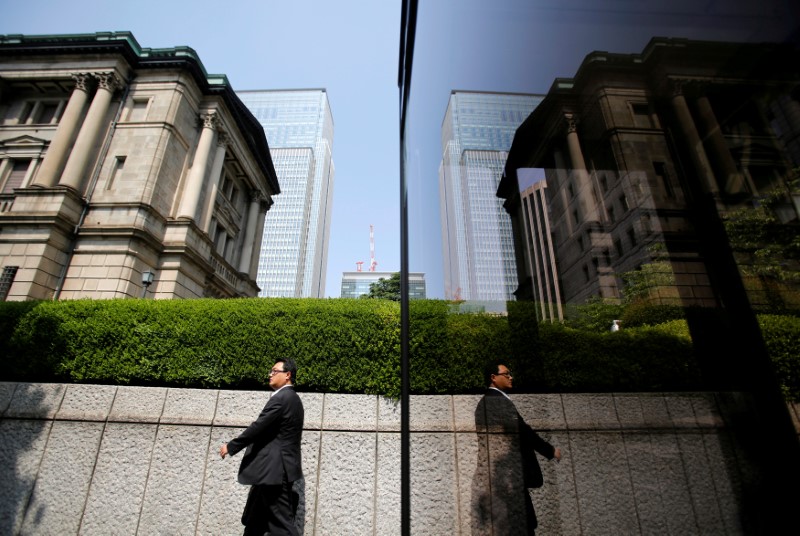By Tetsushi Kajimoto
TOKYO (Reuters) - Japanese exports accelerated sharply in November, yet again pointing to growing momentum in the world's third-biggest economy. There was just one catch: inflation remained stubbornly low and well off the central bank's 2 percent target.
The combination of steady growth and benign consumer prices mean the Bank of Japan will lag other major central banks in exiting crisis-era monetary stimulus, with analysts widely expecting BOJ Governor Haruhiko Kuroda to keep the liquidity tap wide open at a meeting later this week.
"Inflation expectation is in a gradual recovery trend, but a gap between firm economic indicators and weak price indexes remains wide open," said Yuichiro Nagai, economist at Barclays (LON:BARC) Securities.
Indeed, a BOJ survey on Monday showed companies' inflation expectations heightened only a touch in December from three months ago, despite a tight labor market and business confidence at over a decade high.
The persistently low inflation - with core prices running at an annual pace of 0.8 percent - was also hard to square off with the robust performance of Japan Inc., which has benefited from booming exports thanks to upbeat global demand. [nL3N1NZ241
Separate data from the Ministry of Finance showed exports grew 16.2 percent in the year to November, beating a 14.6 percent gain expected by economists in a Reuters poll and accelerating from the prior month's 14.0 percent increase, led by a stellar sales to China and Asia.
Economists expect brisk Asia-bound shipments of electronics and solid capital investment in advanced economies will underpin Japan's export performance in coming months.
"The global economic outlook by IMF and OECD suggests the world economy will remain resilient for the time being, which will provide favourable export conditions," said Takeshi Minami, chief economist at Norinchukin Research Institute.
That upbeat outlook was highlighted in the BOJ's tankan survey on business sentiment last week, which showed big manufacturers' optimism hit an 11-year high.
All of this has helped Japan's economy score its second-longest run of postwar growth. That marked a feather in the cap of Prime Minister Shinzo Abe whose 'Abenomics' stimulus policies have put the nation on the cusp of vanquishing nearly two decades of deflation.
INFLATION, ANYONE?
Many economists, however, are skeptical that consumer price gains will keep up with growth in overall economic activity.
And earlier this month, Kuroda signaled the BOJ may edge away from its crisis-mode stimulus, saying keeping it for too long could undermine regional banks' health.
"The BOJ will likely be forced into cutting its price projections once again in its quarterly outlook report in January. That will highlight a distance to an exit from the BOJ's monetary stimulus," said Barclays' Nagai.
The BOJ quarterly "tankan" survey on corporate inflation expectations survey showed companies expect consumer prices to rise 0.8 percent a year from now, slightly ahead of their projection for a 0.7 percent increase three months ago.
The marginal nudge up in expectations underscored why inflation is still well off the BOJ's target, with firms expecting consumer prices to rise an annual 1.1 percent three years from now and 1.1 percent five years ahead, unchanged from three months ago, the survey showed.
On the external front, the news continued to look up for Japan, offering hope that a much-anticipated virtual circle of private sector-led growth will boost consumption and prices.
The value of exports to China, Japan's largest trading partner, rose 25.1 percent year-on-year in November to 1.38 trillion yen ($12.24 billion), the highest monthly amount on record, led by equipment to manufacture liquid crystal displays (LCD).
Shipments to Asia, which account for more than half of Japan's exports, grew 20.4 percent in the year to November to 3.89 trillion yen, the record amount.
Exports to the United States rose 13.0 percent in the year to November, led by cars and excavators, following a 7.1 percent gain in the previous month.
"The upshot is that net exports should have provided another boost to GDP growth in the current quarter," said Marcel Thieliant, senior Japan economist at Capital Economics.

($1 = 112.7300 yen)